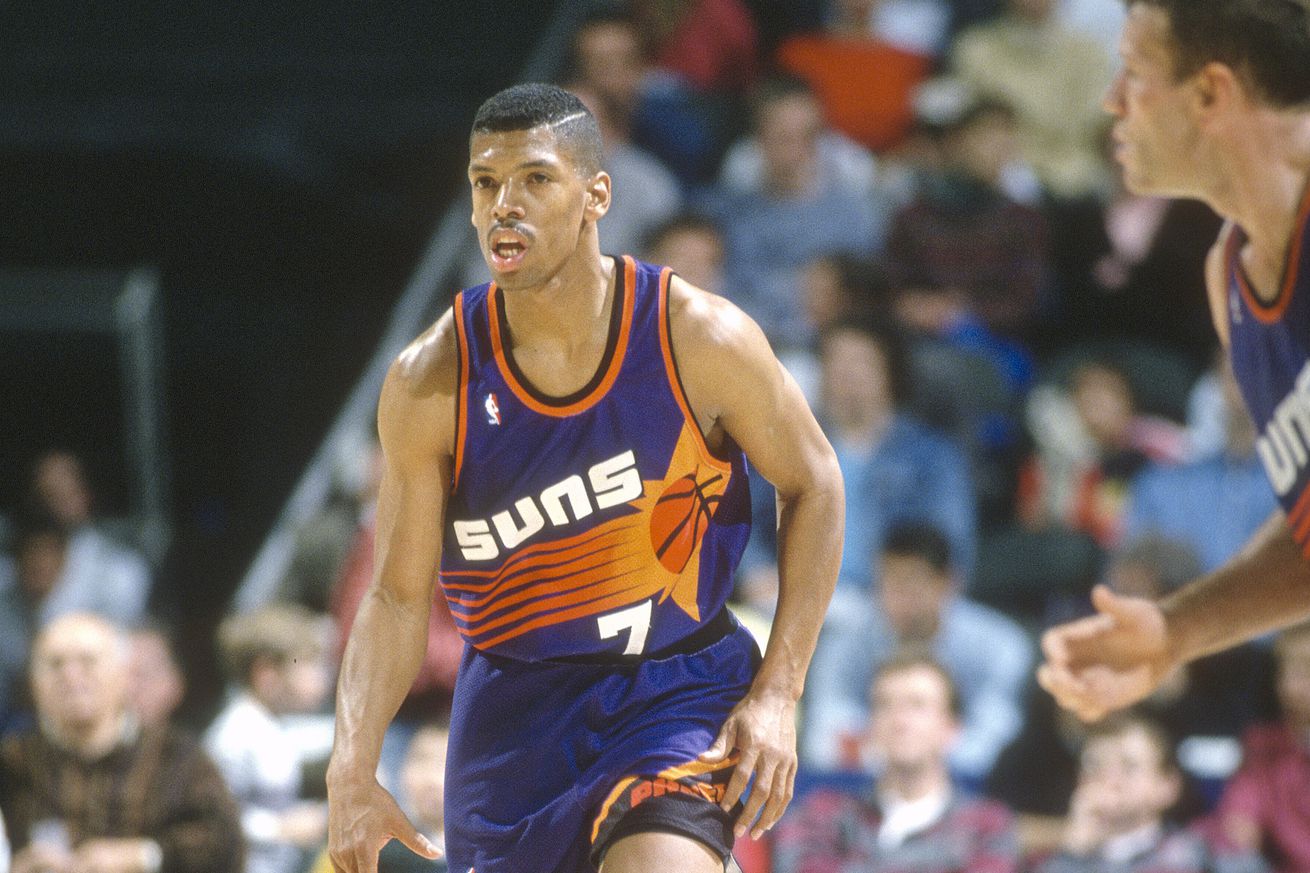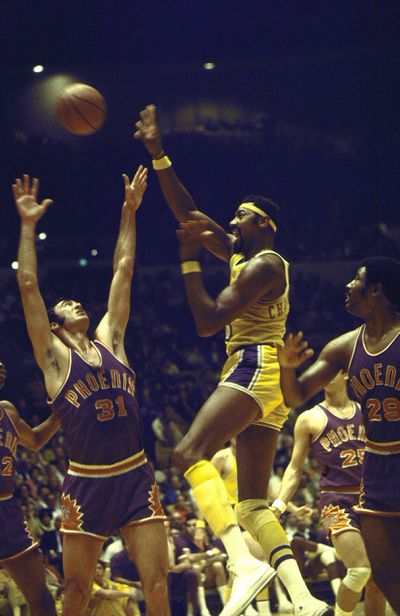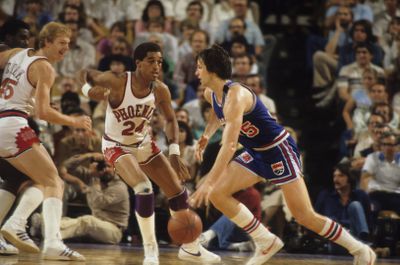
The Phoenix Suns have seen it all in Game 7s, from triumph to total collapse.
Tonight, we witness something that has only occurred 19 times in the history of the NBA: a Game 7 in the NBA Finals. Rarer than a Phoenix Suns postseason appearance (30 times), more nerve-wracking than a missed free throw in crunch time. History leans heavily toward the home team, with a 15–4 record in those previous matchups. But the Indiana Pacers are hoping to author their own twist ending, one that rewrites the odds against the Oklahoma City Thunder.
No matter how this final chapter concludes, this series has been a masterclass in toughness and tenacity. Two defensive-minded squads battling for every inch, every possession. It’s been a fitting crescendo to a wild and unpredictable 2024–25 season.
Game 7. The phrase alone tightens your chest. And for Suns fans? It still stings. You remember, don’t you? May 15, 2022. The 64-win Suns getting blown out 123–90 on their own floor by the Dallas Mavericks. A season full of promise undone in 48 unforgettable and unforgivable minutes. That’s the curse of Game 7s. They don’t care about records, talent, or momentum. They only care about who shows up when the lights burn brightest.
Which brings us to Phoenix’s own history with these ultimate tests. The Suns have played in 10 Game 7s in their franchise’s lifetime, with a record of 4–6. A mix of triumph, heartbreak, and what-ifs.
Here’s a brief look at those battles, moments where everything was on the line and only one team could move forward.
April 9, 1970: Lakers 129, Suns 94
It’s hard to win a basketball game when the other team has 30 points from Wilt Chamberlain, 27 rebounds from Wilt Chamberlain, and 15 assists from Jerry West.
That was the uphill battle the Phoenix Suns faced in their very first postseason appearance in just their second season as an NBA franchise. Their reward? A date with a battle-tested Lakers squad still burning from a seven-game Finals loss in 1969, and one that would again fall short in seven games to the Knicks that very same postseason.
For the young Suns, it was a brutal welcome to playoff basketball. For the Lakers, it was business as usual, superstars playing like supernovas when it mattered most.

SetNumber: X14814
May 16, 1976: Suns 94, Warriors 86
On their way to the franchise’s first-ever NBA Finals appearance, the Phoenix Suns found themselves in a gritty showdown with Rick Barry and the Golden State Warriors. Barry averaged a solid 27.6 points per game in the series, but it was Phoenix’s balance that carried the day. Six Suns averaged double figures in scoring, a testament to their steady, unselfish offense.
Game 7 was no exception.
On the road, under pressure, the Suns delivered. They secured their first-ever Game 7 victory, a milestone moment for a young franchise still finding its identity. Though they would eventually fall to the Boston Celtics in the Finals, that series win over Golden State marked a turning point, proof that Phoenix could rise when the stakes were highest.
May 17, 1979: SuperSonics 114, Suns 110
Just three seasons removed from their first NBA Finals appearance, the Phoenix Suns remained a consistent postseason presence, and their ambitions hadn’t dimmed. With sights set on another run to the Finals, they faced a gritty Seattle SuperSonics team in a back-and-forth series.
After dropping the first two games on the road, Phoenix stormed back with three straight wins, putting themselves in position to close out the series in Game 6 at home. But the moment slipped away. Seattle stole a nail-biter, and a hobbled Alvin Adams, battling through an ankle injury, was no match for the Sonics’ Jack Sikma in Game 7.
Sikma dominated with 33 points and 10 rebounds, delivering the dagger that ended Phoenix’s season. Seattle would ride that momentum to an NBA championship, dispatching the Washington Bullets in five.
May 14, 1981: Kings 95, Suns 88
In 1980–81, the Phoenix Suns stood tall atop the Pacific Division with a 57–25 record. Yes, even better than Magic Johnson’s Lakers. Confidence was high, the core was seasoned, and expectations were justified. But the playoffs are a different beast, and the Kansas City Kings, the fifth seed, proved to be far more than a speed bump.
Led by the quietly relentless Reggie King, who averaged 22.1 points and 8.6 rebounds in the series, Kansas City refused to fold. They hung with Phoenix every step of the way, dragging the series to a decisive Game 7.
And then, in the most pivotal 12 minutes of the season, the Suns disappeared. A flat third quarter in front of their own fans produced just 12 points. The air left the building, and the Kings capitalized, stealing the series and sending the Suns home stunned.
Phoenix had outpaced the Lakers all year. But in the end, it was the Kings who turned the Suns’ best regular season in years into an abrupt postseason disappointment.

Set Number: X25481
June 5, 1993: Suns 123, SuperSonics 110
During the Suns’ unforgettable 1993 postseason run, everything teetered on the edge. This was a team of destiny, but destiny doesn’t come easy.
In the first round, back when the series was best-of-five, Phoenix fell behind 0–2 to the Los Angeles Lakers. The top seed, down and seemingly out. But the Suns responded with grit and fire, winning three straight elimination games to survive and advance.
/ / : “We’re going to win the series.”
Down 0-2 against the Lakers, Head Coach Paul Westphal guaranteed the Suns would win the next 3 games and take the series. The rest is history.@SweetJames | Sweet Plays Since ‘68 pic.twitter.com/sTrzt3dT2y
— Phoenix Suns (@Suns) December 23, 2022
They handled the Spurs in six, but the real war came in the Western Conference Finals against the Seattle SuperSonics. Seven games of haymakers and adjustments. Seven games of tension.
In Game 7, it was Charles Barkley — MVP, warrior, force of nature — who refused to let the season die. He dropped 44 points and grabbed 24 rebounds in a performance that still echoes in the desert. The Suns punched their ticket to the NBA Finals for just the second time in franchise history.
Every run has a defining moment. For Phoenix in ’93, it was Game 7, and Barkley made sure it would never be forgotten.
May 21, 1994: Rockets 104, Suns 94
Chapter 1 of Heartbreak to Houston.
The 1993–94 Phoenix Suns were locked in. Fresh off an NBA Finals appearance and boasting a 56–26 record, the dream was alive, maybe even expected. A return to the Finals felt not just possible, but probable.
Then came Houston.
Led by Hakeem Olajuwon, the Rockets were rising, and the two teams collided in a brutal second-round series. Phoenix came out swinging, stealing the first two games on the road in Houston. Momentum was theirs. Destiny felt like it was right back on track.
But then? The series flipped. Houston answered by taking both games in Phoenix. Just like that, homecourt was restored. From there, the two heavyweights held serve, each defending their floor with pride, force, and desperation.
Game 7. Houston. The Summit.
Hakeem Olajuwon was the difference. Graceful, dominant, unstoppable. He dropped 37 points, pulled down 17 rebounds, and buried the Suns’ Finals hopes with a cold efficiency that only legends possess.
Phoenix went home. Heartbroken. Again.
May 20, 1995: Rockets 115, Suns 114
Heartbreak, Part Two. And this one cut even deeper.
The 1994–95 Phoenix Suns were battle-tested, hungry, and loaded. A 59–23 record. No Michael Jordan to slay the field. The window was wide open, the path was there. A title felt not just possible. It felt overdue.
Then came Houston. Again.
The Rockets limped into the playoffs as the 6-seed, a team bruised and battered by a season of injuries. No longer the top dog. Just prey. Or so we thought.
Phoenix took a 3–1 lead in the series. One win away. One push from the Western Conference Finals. But then…the collapse.
Game 7. Again.
Kevin Johnson went nuclear. 46 points. Left everything he had on the floor. But it wasn’t enough. Not against Hakeem. Not against the ghosts from the year before. Not this time.
364 days after Houston shattered their dreams in Game 7, they did it again. Same villain. Same pain. Just a little sharper this time.
No YouTube links here. No highlights. Some heartbreaks are still too raw to rewatch.
May 6, 2006: Suns 121, Lakers 90
The run in 2006 was nothing short of magical. A season defined by resilience, heart, and a whole lot of buckets.
The journey began with a slugfest against the Los Angeles Lakers in the first round. A classic 2-vs-7 matchup that turned into an all-out war. Kobe Bryant averaged 27.9 points per game in the series, hitting daggers, talking trash, dragging the Lakers to a 3–1 series lead. The Suns? On the brink.
But then, the momentum shifted.
Phoenix stormed back behind the relentless engine of Steve Nash, a reawakened bench mob, and a belief that no lead was safe against them. And when it came to Game 7? That’s when things got weird.
Kobe, the assassin, went quiet. Just three points in the second half. Passive. Detached. It was baffling.
The Suns, on the other hand, smelled blood. They steamrolled the Lakers, flipping what once looked like a collapse into a comeback for the ages. It was the first of two Game 7s that postseason and the start of something unforgettable.
May 22, 2006: Suns 127, Clippers 107
The next round brought another battle with L.A.—but this time, it was the Clippers.
No Amare Stoudemire. No problem. Shawn Marion stepped up and became the steady hand and soaring engine the Suns needed, just as he did all season with STAT out. He averaged 25.6 points and 12.6 rebounds in the series, doing a little bit of everything in true Matrix fashion.
But ask Suns fans what they remember most from that series, and many will point to Raja Bell. Game 5. Down three. Big moment. Daniel Ewing. Bang. Bell knocked down one of the biggest shots of the postseason, a moment etched into Phoenix playoff lore.
By the time Game 7 rolled around, the Suns were rolling. They dispatched the Clippers with ease and earned a spot in the Western Conference Finals.
But after going the distance in back-to-back rounds, Phoenix ran out of steam. Dallas, led by Dirk Nowitzki in his prime, took the series in six. The Suns’ magical run ended in the conference finals, but the legend of that 2006 team still burns bright.
May 15, 2022: Mavericks 123, Suns 90
And speaking of the Dallas Mavericks, the last time the Suns played in a Game 7 was, without question, the most embarrassing of them all.
Fresh off a franchise-record 64-win season, Phoenix entered the 2022 playoffs with championship aspirations. But Luka Doncic had other plans. What unfolded in that decisive Game 7 on the Suns’ home floor wasn’t just a loss. It was a public unraveling.
From the opening tip, Dallas applied pressure. The Suns crumbled. Doncic toyed with them, smiling as he scored at will. The final score barely captures the humiliation. The top seed didn’t just fall. They collapsed.
That game didn’t just end a season. It ended an era. The front office felt it, the fans felt it, and the players felt it. Less than a year later, the Suns went all-in on a seismic midseason trade for Kevin Durant, an effort to recalibrate and redeem.
Ah yes, memory lane. A bumpy ride filled with nerves, legends, and more heartbreak than triumph. Ten Game 7s. A 4–6 record. Not exactly a highlight reel, but those games are stitched into the Suns’ fabric all the same.
They’re reminders. Of how brutal, how delicate, how razor-thin the margin for error becomes in a win-or-go-home setting. You can have the talent. You can have the chemistry. But Game 7 has a way of unraveling it all. The lights get brighter. The pressure swells. Every possession feels like a test of will.
True champions don’t just survive that. They rise in it. They find the extra gear, the mental edge, the poise to push through. And tonight, we’ll witness that moment once again. One team will break through. One team will be remembered.
Game 7. This is what it’s all about.
Listen to the latest episode of the Suns JAM Session Podcast below. To stay up to date on every episode, subscribe to the pod on Apple, Spotify, YouTube, YouTube Podcasts, Amazon Music, Podbean, or Castbox.
Please subscribe, rate, and review.